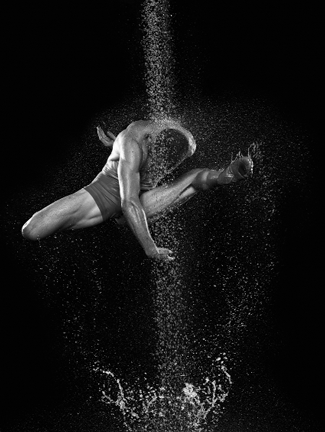Volume 4, Number 44 | November 3 – 9, 2005
BALLET
Cedar Lake Contemporary
Ballet
547 W. 26th St.
Nov. 3-5, 10-12 8 p.m.,
Nov. 5 & 12 2 p.m.
$10-$30; 212-868-4444
Courtesy Cedar Lake Contemporary Ballet
Jason Kittelberger of Cedar Lake Contemporary Ballet, debuting its new space in Chelsea, running through November 12.
New Sprouts in Chelsea
Cedar Lake Ballet debut offers cause for great expectations
Cedar Lake opened its new Chelsea headquarters, complete with black box theater, for a first run of performances. The company’s contemporary ballet is interestingly laced with African sensibility, modern and popular moves. The company danced new works of three emerging choreographers—Edwaard Lliang, Jodie Gates, and Cedar Lake’s new artistic director Benoit-Swan Pouffer, a former Alvin Ailey dancer.
The three works blend into each other in a collaborative spirit, and this worked well in the first half. Edwaard Lliang’s “This Mortal Coil” begins with an energetic solo by Kristen Elizabeth Weiser to “Song to the Siren.” Her blond hair flies, an integral kinetic element, catching the light. Nevertheless the solo is dense and dramatic—immediately setting an undercurrent of struggle, oppression, breaking free, and dancing.
Vivaldi’s music accompanies most of the balance of this piece which features crab-like curled postures—dancers en pointe contract inward like segmented crustaceans. Finally, to “Stabat Mater,” extended arms and legs are retracted sharply and couples replace each other in the limelight. Dancers riff off partner’s phrases the way hip-hop dancer do. A stunning projection of a prison window ends Lliang’s piece, turning the stage into a cavernous cell.
Jodie Gates’ structured improvisation “Momentary Play” follows without a pause. Continuing the theme of struggle and incarceration, curtains that drop down suddenly around duets are yanked off the stage with the dancers. Roderick George slides, runs, and flies in a sinuous solo—a highlight. However, when all nine are on stage, the steamy activity imagined in the translucent curtains is scattered, and the live violist Leanne Darling steals the show.
A real intermission would clear the palate nicely for Pouffer’s “Seed,” or just the running water that begins Stefano Zazzera’s wonderful sound score. In a video on a Stonehenge-like arrangement of massive curved screens, the dancers swim underwater—with earphones. They are alone in a crowd, as in iPod culture. Jason Kittelberger is tethered to a sort of umbilical cord that stretches from his crocheted costume, which unravels as he dances, revealing his muscled midriff.
There are several excellent choreographies for the group in “Seed.” A workers’ dance of brotherhood and a playful children’s dance are imaginative and inspired. The dancers perform at their best—with surprising tours en l’air by Radoslaw Kokoszka, and a willowy duet near the end, which nicely features Jessica Coleman Scott with Christopher Adams.
There are many reasons for optimism.
gaycitynews.com


































